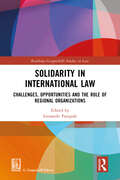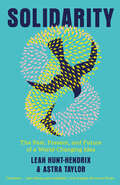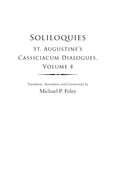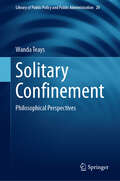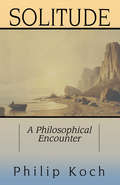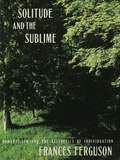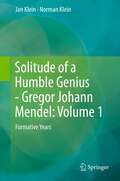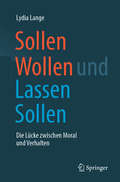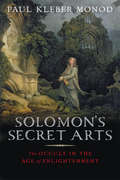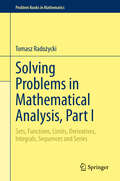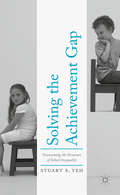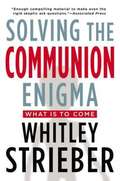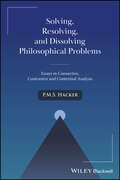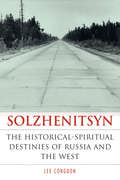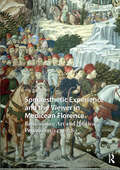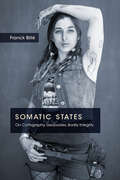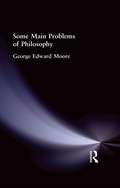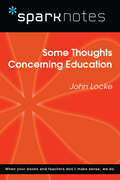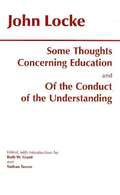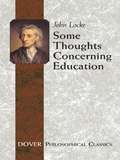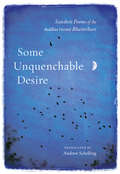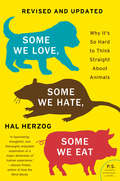- Table View
- List View
Solidarity in International Law: Challenges, Opportunities and The Role of Regional Organizations (Routledge-Giappichelli Studies in Law)
by Leonardo PasqualiThe principle of solidarity is particularly important now because it is in juxtaposition to some current self-centered trends in politics: the crises that have upset the world in recent years, such as migrations, hegemonic aspirations, pandemics, and wars, have made self-evident the inadequacy of such selfish politics. It therefore seems very useful to understand the role that solidarity could play in contemporary scenarios. This book thus collects various contributions on the principle of solidarity in international law. Firstly, it reconstructs the foundations of solidarity in law and investigates the origins of the principle. Subsequently, it tries to ascertain if solidarity exists as a principle in international law and, if so, what its scope is. The book then examines the eventual implementation of the principle of solidarity in regional organizations law: the question is whether solidarity is more effective and if it is actually better fulfilled when relationships between states get stronger, such as in regional and sub-regional organizations. Such implementation is notable in EU Law, but the analysis also involves other regional and sub-regional organizations, namely the African Union, ECOWAS, the League of Arab States, and MERCOSUR. This book takes into account not only some distinctive areas of solidarity, such as migration law, or specific institutional contexts where solidarity is a declared principle, objective or value, for example, the European Union, but it also considers whether, and to what extent, the manifestations of solidarity differ in disparate settings, trying to discover the reasons behind such divergences. The book will be of interest to researchers and academics in the areas of International Law, International Organizations Law, European Law, Human Rights Law, Business Law, and Constitutional Law.
Solidarity: The Past, Present, and Future of a World-Changing Idea
by Astra Taylor Leah Hunt-HendrixA VULTURE BEST BOOK • From renowned organizers and activists Leah Hunt-Hendrix and Astra Taylor, comes the first in-depth examination of Solidarity—not just as a rallying cry, but as potent political movement with potential to effect lasting change. A DAYTON LITERARY PEACE PRIZE FINALIST&“A window into what is possible when we reject the politics of division, trade individualism for interconnectedness and prioritize coming together for the greater good.&”—Heather McGhee, author of The Sum of Us: What Racism Costs Everyone"Reads at once like a moral treatise and a rallying manifesto, a call to reflect and lock arms.&”—The Washington PostSolidarity is often invoked, but it is rarely analyzed and poorly understood. Here, two leading activists and thinkers survey the past, present, and future of the concept across borders of nation, identity, and class to ask: how can we build solidarity in an era of staggering inequality, polarization, violence, and ecological catastrophe? Offering a lively and lucid history of the idea—from Ancient Rome through the first European and American socialists and labor organizers, to twenty-first century social movements like Occupy Wall Street and Black Lives Matter—Hunt-Hendrix and Taylor trace the philosophical debates and political struggles that have shaped the modern world.Looking forward, they argue that a clear understanding of how solidarity is built and sustained, and an awareness of how it has been suppressed, is essential to warding off the many crises of our present: right-wing backlash, irreversible climate damage, widespread alienation, loneliness, and despair. Hunt-Hendrix and Taylor insist that solidarity is both a principle and a practice, one that must be cultivated and institutionalized, so that care for the common good becomes the central aim of politics and social life.
Solidarität in Zeiten multipler Krisen: Imperiale Lebensweise und Politische Bildung (Citizenship. Studien zur Politischen Bildung)
by Dirk Lange Ulrich Brand Lara KierotIn diesem Sammelband werden aus unterschiedlichen fachspezifischen, wissenschaftlichen und praktischen Perspektiven vielfältige Aspekte des Themas „Imperiale Lebensweise und Politische Bildung“ beleuchtet und kritisch reflektiert. Die didaktischen Potenziale unterschiedlicher wissenschaftlicher Herangehensweisen und Praxiserfahrungen werden vorgestellt und theoretische Überlegungen sowie empirische Erkenntnisse zum Schwerpunktthema präsentiert.
Soliloquies: St. Augustine's Cassiciacum Dialogues, Volume 4
by Saint AugustineA fresh, new translation of Augustine’s fourth work as a Christian convert The first four works written by St. Augustine of Hippo after his conversion to Christianity are dialogues that have influenced prominent thinkers from Boethius to Bernard Lonergan. Usually called the Cassiciacum dialogues, these four works are of a high literary and intellectual quality, combining Ciceronian and neo-Platonic philosophy, Roman comedy and Vergilian poetry, and early Christian theology. They are also, arguably, Augustine’s most charming works, exhibiting his whimsical levity and ironic wryness.Soliloquies is the fourth work in this tetralogy. Augustine coined the term “soliloquy” to describe this new form of dialogue. Soliloquies, a conversation between Augustine and his reason, fuses the dialogue genre and Roman theater, opening with a search for intellectual and moral self-knowledge before converging on the nature of truth and the question of the soul’s immortality. Foley’s volume also includes On the Immortality of the Soul, which consists of notes for the unfinished portion of the work.
Solitary Confinement: Philosophical Perspectives (Library of Public Policy and Public Administration #20)
by Wanda TeaysThis book journeys into the dark territory of solitary confinement. It examines its practice in prisons, jails, immigration detention facilities, and even schools. It looks at international ethics codes such as that of the World Medical Association, the World Health Organization, and the Declaration of Tokyo, all of which describe the prolonged use of solitary confinement as akin to torture. The author shows how the philosophical theories of Jeremy Bentham, John Stuart Mill, Aristotle, Immanuel Kant, John Rawls, and others provide an ethical framework for examining solitary confinement. With the aid of contemporary ethicists like Tom Beauchamp, Michael Boylan, Michel Foucault, Claudia Card and Nel Noddings, it also shows how we have the tools for dismantling a practice long overdue for reform. Students, faculty, and the general public will find Solitary Confinement: Philosophical Perspectives a call for change of an urgent human rights issue. Given that thousands of people have been subjected to such extreme isolation and sensory deprivation, this quest warrants our utmost consideration.
Solitary Confinement: Social Death and Its Afterlives
by Lisa GuentherProlonged solitary confinement has become a widespread and standard practice in U.S. prisons—even though it consistently drives healthy prisoners insane, makes the mentally ill sicker, and, according to the testimony of prisoners, threatens to reduce life to a living death. In this profoundly important and original book, Lisa Guenther examines the death-in-life experience of solitary confinement in America from the early nineteenth century to today&’s supermax prisons. Documenting how solitary confinement undermines prisoners&’ sense of identity and their ability to understand the world, Guenther demonstrates the real effects of forcibly isolating a person for weeks, months, or years.Drawing on the testimony of prisoners and the work of philosophers and social activists from Edmund Husserl and Maurice Merleau-Ponty to Frantz Fanon and Angela Davis, the author defines solitary confinement as a kind of social death. It argues that isolation exposes the relational structure of being by showing what happens when that structure is abused—when prisoners are deprived of the concrete relations with others on which our existence as sense-making creatures depends. Solitary confinement is beyond a form of racial or political violence; it is an assault on being.A searing and unforgettable indictment, Solitary Confinement reveals what the devastation wrought by the torture of solitary confinement tells us about what it means to be human—and why humanity is so often destroyed when we separate prisoners from all other people.
Solitude
by Philip KochIn Koch's Solitude, both solitude and engagement emerge as primary modes of human experience, equally essential for human completion. This work draws upon the vast corpus of literary reflections on solitude, especially Lao Tze, Sappho, Plotinus, Augustine, Petrarch, Montaigne, Goethe, Shelley, Emerson, Thoreau, Whitman and Proust."Koch uses the work of philosophers, historians, and writers, as well as texts such as the Bible, to show what solitude is and isn't, and what being alone can do to and for the individual. Interesting for its literary scope and its conclusions about all the good true solitude can bring us."-Booklist"Reading this book is like dipping into many minds, fierce and gentle. The author reveals his long study of great philosophers, and interprets their thoughts through the lens of his own experience with solitude. He traces our early brushes with solitude and the fear it can engender, then the craving for solitude that comes with full, adult lives."-NAPRA Review
Solitude and the Sublime: The Romantic Aesthetics of Individuation
by Frances FergusonAs interest in aesthetic experience evolved in the eighteenth century, discussions of the sublime located two opposed accounts of its place and use. Ferguson traces these two positions - the Burkean empiricist account and the Kantian formalist one - to argue that they had significance of aesthetics, including recent deconstructive and New Historicist criticism.
Solitude of a Humble Genius - Gregor Johann Mendel: Formative Years
by Norman Klein Jan KleinGregor Johann Mendel continues to fascinate the general public as well as scholars, the former for his life and the latter for his achievements. Solitude of a Humble Genius is a two-volume biography presenting Mendel in the context of the history of biology and philosophy, and in the context of the setting in which he lived and worked. In this first volume the authors set the stage for a new interpretation of Mendel's achievements and personality. The period of Mendel's life covered by this volume is critical to understanding why he saw what other biologists, including Charles Darwin, for example, didn't. In searching for clues to Mendel's thinking, the authors discuss at length the origin of his genes; the history of the region of his birth; they also spend a day and then the four seasons of the year with his family; and finally they examine the schooling he received, as well as the cultural and political influences he was exposed to. An indispensible part of the work is Norman Klein's artwork. In this first volume alone, it comprises nearly 80 original drawings and includes cartoons that enliven the narration, scenes from Mendel's life, portraits, and plans and drawings of the cities and buildings in which he lived, studied, and worked.
Sollen Wollen und Lassen Sollen: Die Lücke zwischen Moral und Verhalten
by Lydia LangeDieses Buch untersucht auf evolutionspsychologischer Basis Moral und ihre Auswirkungen. Wir teilen die Welt in gut und böse ein. Moral soll sie verbessern. Da sie am Ideal ausgerichtet ist, nicht an Naturgesetzen, führt Moral häufig zu gesellschaftlich unerwünschten Nebenwirkungen. Um unsere sittlichen Ideale an das dem Menschen Mögliche anzupassen, benötigen wir neben der Moral weitere vorläufige Ergebnisse der kulturellen Evolution: gesellschaftliche Institutionen, Recht, Technik, Wissenschaft, Politik. Diese können dem Menschen dienlich sein, wenn sie die Natur des Menschen berücksichtigen.
Solomon's Secret Arts
by Paul Kleber MonodThe late seventeenth and eighteenth centuries are known as the Age of Enlightenment, a time of science and reason. But in this illuminating book, Paul Monod reveals the surprising extent to which Newton, Boyle, Locke, and other giants of rational thought and empiricism also embraced the spiritual, the magical, and the occult. Although public acceptance of occult and magical practices waxed and waned during this period they survived underground, experiencing a considerable revival in the mid-eighteenth century with the rise of new antiestablishment religious denominations. The occult spilled over into politics with the radicalism of the French Revolution and into literature in early Romanticism. Even when official disapproval was at its strongest, the evidence points to a growing audience for occult publications as well as to subversive popular enthusiasm. Ultimately, finds Monod, the occult was not discarded in favor of â œreasonâ ? but was incorporated into new forms of learning. In that sense, the occult is part of the modern world, not simply a relic of an unenlightened past, and is still with us today.
Solving Problems in Mathematical Analysis, Part I: Sets, Functions, Limits, Derivatives, Integrals, Sequences and Series (Problem Books in Mathematics)
by Tomasz RadożyckiThis textbook offers an extensive list of completely solved problems in mathematical analysis. This first of three volumes covers sets, functions, limits, derivatives, integrals, sequences and series, to name a few. The series contains the material corresponding to the first three or four semesters of a course in Mathematical Analysis.Based on the author’s years of teaching experience, this work stands out by providing detailed solutions (often several pages long) to the problems. The basic premise of the book is that no topic should be left unexplained, and no question that could realistically arise while studying the solutions should remain unanswered. The style and format are straightforward and accessible. In addition, each chapter includes exercises for students to work on independently. Answers are provided to all problems, allowing students to check their work.Though chiefly intended for early undergraduate students of Mathematics, Physics and Engineering, the book will also appeal to students from other areas with an interest in Mathematical Analysis, either as supplementary reading or for independent study.
Solving the Achievement Gap: Overcoming the Structure of School Inequality
by Stuart S. YehThis book examines the cause of the student achievement gap, suggesting that the prevailing emphasis on socioeconomic factors, sociocultural influences, and teacher quality is misplaced. The cause of the achievement gap is not differences in parenting styles, or the economic advantages of middle-class parents, or differences in the quality of teachers. Instead, schools present learning tasks and award grades in ways that inadvertently undermine the self-efficacy, engagement, and effort of low-performing students, causing demoralization and exacerbating differences in achievement that are seen to exist as early as kindergarten. This process systematically maintains and widens initial gaps in achievement that might otherwise be expected to disappear over the K-12 years. Misdiagnosis of the nature of the achievement gap has led to misguided solutions. The author draws upon a range of research studies to support this view and to offer recommendations for improvement.
Solving the Communion Enigma: What Is To Come
by Whitley StrieberThe bestselling author probes the ultimate significance behind today's increasing reports of UFOs, alien abductions, crop circles, and other unexplained phenomena-and what they mean for humanity's immediate future. In 1987 writer Whitley Strieber exposed the world to the truth about alien abduction in his landmark memoir, Communion. For the first time in years, Strieber revisits his encounter with alien intelligences-but now dramatically widens his search to explore how "the visitors" connect with today's persistent and globe-spanning reports of anomalous phenomena, such as crop circles, cattle mutilations, UFO sightings, alien abductions, near-death experiences, close encounters, and unexplained bodily implants.In his magisterial style, Strieber contextualizes these bizarre and unsettling reports with his own childhood memories of strange schools, sinister experiments, and family secrets. In exploring today's most convincing cases of unexplained phenomena, Strieber reasons that they are not unrelated events. Nor are they the result of mass delusion. In some of his most persuasive writing, Strieber argues that the wave of mysterious episodes marks a transition that humanity is undergoing right now. Against all conscious understanding, we are experiencing a broadened awareness of dimensions of reality that exist beyond our current perceptions.
Solving, Resolving, and Dissolving Philosophical Problems: Essays in Connective, Contrastive and Contextual Analysis
by P. M. HackerEquips readers with the intellectual tools required to tackle perennial philosophical problems Solving, Resolving, and Dissolving Philosophical Problems is addressed to all who are interested in philosophical questions. It presupposes little philosophical knowledge, only curiosity and an open mind. It demands a willingness to learn not doctrine but method, and the courage to suspend judgement and to challenge received ideas. Advocating the method of the 3 C-s: Connective, Contrastive, and Contextual Analysis, the book demonstrates the method by putting it to work — examining fifteen salient philosophical questions that concern all thinking people. It is organized thematically into four parts. Part I introduces questions in philosophy of psychology (the nature of the mind; the mind/body problem; the nature of consciousness and its demystification; knowledge of other minds). Part II deals with epistemological questions (knowledge, belief; memory; imagination, thinking; dreaming). Part III deals with value (the roots of morality; the nature of good and evil; the need for a secular conception of the soul; happiness). The application of the method in the essays produces striking, original and unanticipated results that will give readers pause. The final part of the book articulates in detail the methodology of the 3 C-s exemplified by the fifteen essays and defends it against objections. Solving, Resolving, and Dissolving Philosophical Problems: On the Methodology of Connective, Contrastive, and Contextual Analysis is an excellent textbook for undergraduate students in introductory philosophy courses alongside more advanced scholars, as well as an invaluable resource for educated general readers with an interest in philosophical methodology.
Solzhenitsyn: The Historical-Spiritual Destinies of Russia and the West (NIU Series in Slavic, East European, and Eurasian Studies)
by Lee CongdonThis study of Aleksandr Solzhenitsyn (1918–2008) and his writings focuses on his reflections on the religiopolitical trajectories of Russia and the West, understood as distinct civilizations. What perhaps most sets Russia apart from the West is the Orthodox Christian faith. The mature Solzhenitsyn returned to the Orthodox faith of his childhood while serving an eight-year sentence in the GULag Archipelago. He believed that when men forget God, communism or a similar catastrophe is likely to be their fate. In his examination of the author and his work, Lee Congdon explores the consequences of the atheistic socialism that drove the Russian revolutionary movement. Beginning with a description of the post-revolutionary Russia into which Solzhenitsyn was born, Congdon outlines the Bolshevik victory in the civil war, the origins of the concentration camp system, and the Bolsheviks' war on Christianity and the Russian Orthodox Church. He then focuses on Solzhenitsyn's arrest near the war's end, his time in the labor camps, and his struggle with cancer. Congdon describes his time in exile and increasing alienation from the Western way of life, as well as his return home and his final years. He concludes with a reminder of Solzhenitsyn's warning to the West—that it was on a path parallel to that which Russia had followed into the abyss. This important study will appeal to scholars and educated general readers with an interest in Solzhenitsyn, Russia, Christianity, and the fate of Western civilization.
Somaesthetic Experience and the Viewer in Medicean Florence: Renaissance Art and Political Persuasion, 1459-1580 (Visual and Material Culture, 1300-1700)
by Allie Terry-FritschViewers in the Middle Ages and Renaissance were encouraged to forge connections between their physical and affective states when they experienced works of art. They believed that their bodies served a critical function in coming to know and make sense of the world around them, and intimately engaged themselves with works of art and architecture on a daily basis. This book examines how viewers in Medicean Florence were self-consciously cultivated to enhance their sensory appreciation of works of art and creatively self-fashion through somaesthetics. Mobilized as a technology for the production of knowledge with and through their bodies, viewers contributed to the essential meaning of Renaissance art and, in the process, bound themselves to others. By investigating the framework and practice of somaesthetic experience of works by Benozzo Gozzoli, Donatello, Benedetto Buglioni, Giorgio Vasari, and others in fifteenth- and sixteenth century Florence, the book approaches the viewer as a powerful tool that was used by patrons to shape identity and power in the Renaissance.
Somatic States: On Cartography, Geobodies, Bodily Integrity
by Franck BilléIn Somatic States, Franck Billé examines the conceptual link between the nation-state and the body, particularly the visceral and affective attachment to the state and the symbolic significance of its borders. Billé argues that corporeal analogies to the nation-state are not simply poetic or allegorical but reflect a genuine association of the individual body with the national outline—an identification greatly facilitated by the emergence of the national map. Billé charts the evolution of cartographic practices and the role that political maps have played in transforming notions of territorial sovereignty. He shows how states routinely and effectively mobilize corporeal narratives, such as framing territorial loss through metaphors of dismemberment and mutilation. Despite the current complexity of geopolitics and neoliberalism, Billé demonstrates that corporeality and bodily metaphors remain viscerally powerful because they offer a seemingly simple way to apprehend the abstract nature of the nation-state.
Some Main Problems of Philosophy
by Moore, George EdwardFirst published in 2002. Routledge is an imprint of Taylor & Francis, an informa company.
Some Thoughts Concerning Education (SparkNotes Philosophy Guide)
by SparkNotesSome Thoughts Concerning Education (SparkNotes Philosophy Guide) Making the reading experience fun! SparkNotes Philosophy Guides are one-stop guides to the great works of philosophy–masterpieces that stand at the foundations of Western thought. Inside each Philosophy Guide you&’ll find insightful overviews of great philosophical works of the Western world.
Some Thoughts Concerning Education and Of The Conduct Of The Understanding
by John LockeThis volume offers two complementary works, unabridged, in modernised, annotated texts -- the only available edition priced for classroom use. Ruth W. Grant and Nathan Tarcov provide a concise introduction, a note on the texts, and a select bibliography.
Some Thoughts Concerning Education: Including Of the Conduct of the Understanding
by John LockeIn the influential essays included in this volume, the renowned English philosopher John Locke (1632-1704) advocated a more "modernized" course of education. Focusing on the curriculum, the stimulation of children's interests and imagination, and the function of play, he showed how to instill virtue and morality in children, rather than merely pumping them full of information and facts. <p><p> From the ineffectiveness of physical punishment to the best methods of teaching foreign languages and table manners, these essays comprise an enlightened view of childhood and education that revolutionized educational theory. Locke stressed the teaching of rational thinking, moral dependability, and social grace in the classroom, with the aim of helping students to not only reflect but take action. Locke's writings on education are enlightening reading for philosophy students, teachers, and for anyone interested in educational reform.
Some Turns of Thought in Modern Philosophy: Five Essays
by George SantayanaThis work contains five essays on modern philosophy entitled: Locke and the Frontiers of Common Sense; Fifty Years of British Idealism; Revolutions in Science; A Long Way Round to Nirvana; The Prestige of the Infinite.
Some Unquenchable Desire: Sanskrit Poems of the Buddhist Hermit Bhartrihari
by BhartrihariAn award-winning translator finds surprisingly modern themes in a selection of erotic and religious stanzas from one of classical India's most celebrated poets.Although few facts are known about his life, the Indian poet Bhartrihari leaps from the page as a remarkably recognizable individual. Amidst a career as a linguist, courtier, and hermit, he used poetry to explore themes of love, desire, impermanence, despair, anger, and fear. “A thousand emotions, ideas, words, and rhythmic syllables stormed through him,” writes translator Andrew Schelling in an evocative introduction. “In particular he shows himself torn between sexual desire and a hunger to be free of failed love affairs and turbulent karma.” Schelling’s translation represents a rare opportunity for English-language readers to become acquainted with this fascinating poet. Attuned to Bhartrihari’s unique poetic sensibility, Schelling has produced a compelling, personally curated set of translations.
Some We Love, Some We Hate, Some We Eat [Second Edition]: Why It's So Hard to Think Straight About Animals
by Hal HerzogA maverick scientist who co-founded the field of anthrozoology offers a controversial, thought-provoking, and unprecedented exploration of the psychology behind the inconsistent and often paradoxical ways we think, feel, and behave towards animals. How do we reconcile our love for cats and dogs (and rabbits, snakes, hamsters, gerbils, and goldfish) with our appetite for hamburgers and chicken breast and our use of medications that have been tested on lab mice? Why do so many of us—as meat eaters, recreational hunters and fishermen, and visitors of zoos and circuses—take the moral high ground when it comes to condemning activities like cockfighting? And why are dogs considered pets in America but dinner in Korea? With Some We Love, Some We Hate, Some We Eat, Hal Herzog offers a lively and deeply intelligent look inside our complex and often paradoxical relationships with animals. Drawing on over two decades of research in the interdisciplinary field of anthrozoology, the science of human-animal relations, Herzog examines the moral and ethical decisions we all face when it comes to the furry and feathered creatures with whom we share this planet. Alternately poignant and laugh-out-loud funny, Some We Love, Some We Hate, Some We Eat takes readers on a highly entertaining and illuminating journey through the full spectrum of human-animal relations, relating Dr. Herzog’s groundbreaking research on animal rights activists, cockfighters, professional dog show handlers, veterinary students, biomedical researchers, and circus animal trainers. Through psychology, history, biology, sociology, cross-cultural analysis, current animal rights debates, and the morality and ethics surrounding the use and abuse of animals, Herzog carefully crafts a seamless narrative composed of real life anecdotes, academic and scientific research, cross-cultural examples, and his own sense of moral confusion. Combining the intellectual rigor of Michael Pollan’s The Omnivore’s Dilemma with the wry observation of Bill Bryson’s A Walk in the Woods, Herzog offers a refreshing new perspective on our lives with animals—one that will forever change the way we look at our relationships with other creatures and, in so doing, will also change the way we look at ourselves.
